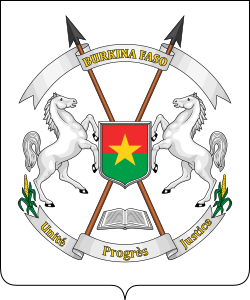 |
|---|
Presidents of Burkina Faso legislatures.
Below is a list of presidents of Conseil-General:
| Name | Entered office | Left office |
|---|---|---|
| Georges Konseiga | 1948 | 1948 |
| Christophe Kalenzaga | 1949 | 1949 |
| Pierre Bernard | 1950 | 1950 |
| Guillaume Ouedraogo | 1950 | 1951 |
| Tibo B. Ouedraogo | 1951 | 1952 |
Below is a list of presidents of the Territorial Assembly:
Contents
| Name | Entered office | Left office |
|---|---|---|
| Joseph Ouedraogo | 1952 | 1954 |
| Mathias Sorgho | 1954 | 1957 |
| Yalgado Ouedraogo | April 1957 | July 1957 |
| Nazi Boni | December 1957 | February 1958 |
| Laurent Bandaogo | 1958 | 1958 |
Below is a list of presidents of the Constituent Assembly:
| Name | Entered office | Left office |
|---|---|---|
| Begnon-Damien Kone | 1958 | 1960 |
Below is a list of presidents of the National Assembly of Upper Volta and Burkina Faso:
| Name | Entered office | Left office | |
|---|---|---|---|
| First Republic (1960–1966) | Begnon-Damien Kone | 1960 | January 3, 1966 |
| Second Republic (1970–1977) | Joseph Ouedraogo | 1970 | February 8, 1974 |
| Third Republic (1977–1980) | Gérard Kango Ouedraogo | 9 June 1978 | November 25, 1980 |
| Fourth Republic (1991–2014) | Bongnessan Arsène Ye | June 17, 1992 | June 17, 1997 |
| Mélégué Maurice Traoré | June 17, 1997 | June 14, 2002 | |
| Roch Marc Christian Kaboré | June 14, 2002 | December 28, 2012 | |
| Soungalo Ouattara | December 28, 2012 | October 30, 2014 | |
| vacant | October 30, 2014 | November 27, 2014 | |
| National Transitional Council (2014–2015) | Chérif Sy | November 27, 2014 | December 30, 2015 |
| Semi-presidential republic (2015–2022) | Salif Diallo | December 30, 2015 | August 19, 2017 (Died in office) |
| Bénéwendé Stanislas Sankara (Acting) | August 19, 2017 | September 8, 2017 | |
| Alassane Bala Sakandé | September 8, 2017 | 24 January 2022 (deposed) | |
| Legislative Assembly (2022–present) | Aboubacar Toguyeni | 22 March 2022 [1] | 11 November 2022 |
| Ousmane Bougouma | 11 November 2022 [1] | Incumbent |